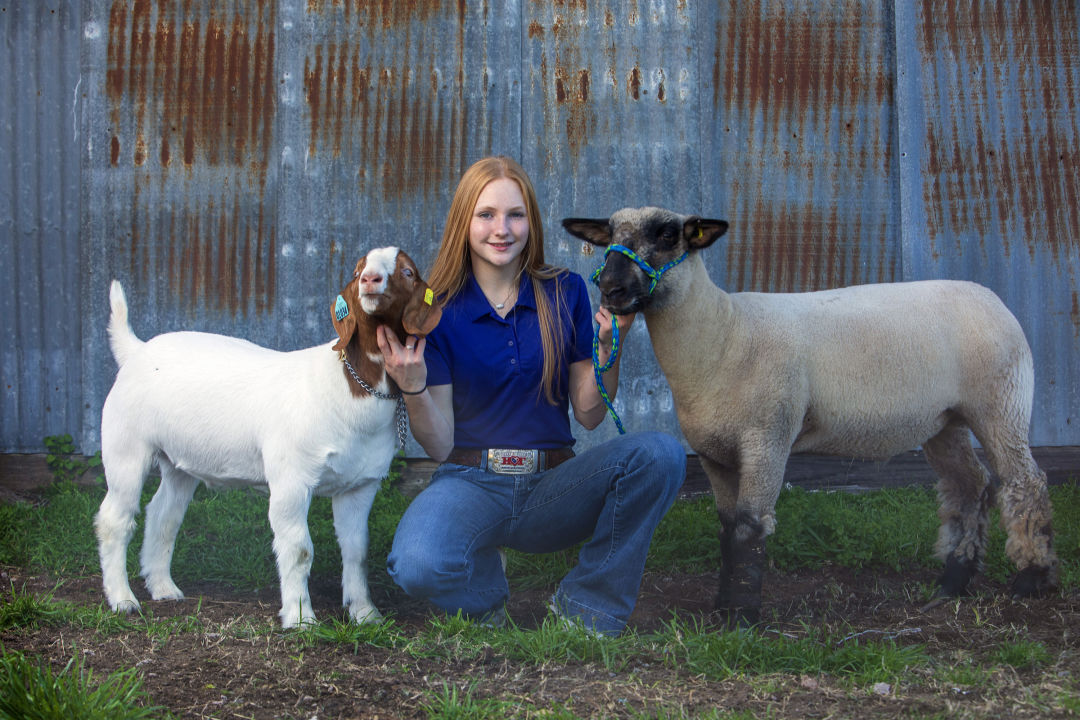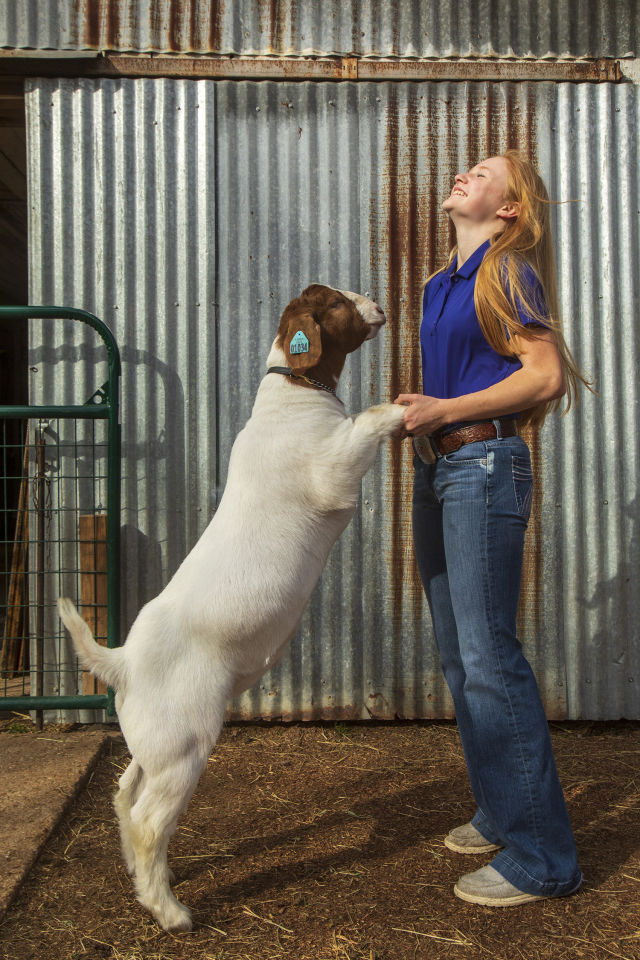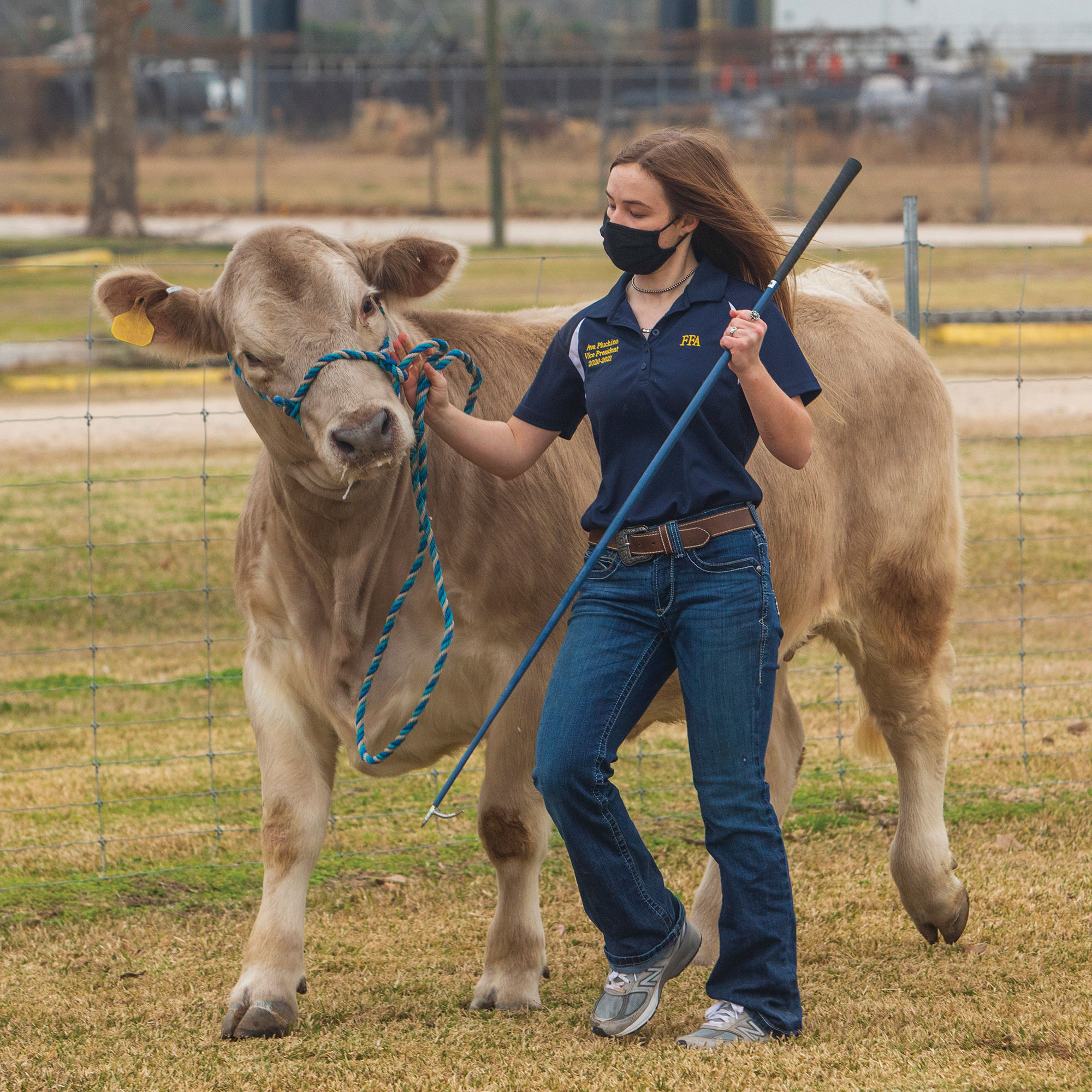Armed with Lambs and Goats, Anna Reed Is Ready for This Year's Rodeo

Reed with show hopefuls Kevin (left) and Carl.
Image: Daniel Kramer
With her hair pulled into a signature ponytail, her animals safely penned, confident that she’d done all the prep work she could, Anna Reed had high hopes for how things would play out last March. The Tomball High School student, a freshman at the time, was in the Houston Livestock Show and Rodeo’s poultry area that afternoon being tested on her ability to judge eggs, carcasses, and meat, when a stir rippled through the crowd. While nearby screens advised people to remain calm and evacuate, Anna’s mom was frantically trying to get her into the goat area. At the same time, organizers were ushering everyone into the arena.
Covid-19 had arrived at Reliant Park, and it was shutting everything down—the livestock show, the carnival and rodeo, too. On the heels of that shock came another: In lieu of the original two-day plan, every goat participant was showing that day. “All the kids who were supposed to show the next day didn’t have their clothes,” Anna says. “Some kids had to show in shorts and T-shirts instead of nice jeans and collared shirts. Some kids bought clothes from vendors.”
As for Anna, although the poultry show had her in acceptable attire, even she wasn’t 100-percent ready. “I didn’t have my lucky shirt,” she says of the purplish-blue top mom Michele Reed lovingly refers to as “blurple.”
Nevertheless, with last-minute adjustments and a deep breath or two, participants moved forward with the long night of judging. “It was hard because they say you get three seconds to impress a judge,” says Anna, whose older sister got the family started down the stock show track, and is now an eight-year veteran herself. “But he was touching two goats at the same time, so you got one second. It was all over the place.”
Strange as the experience was, and despite the fact that she didn’t make the sale, it didn’t dampen the teen’s drive. In fact, she’s headed back in 2021, this time armed with lambs and goats.

Image: Daniel Kramer
Right off the bat, she said, this year was different. The 16-year-old anticipated animal prices might be lower with Covid’s impact on the economy, but prices actually increased. There were fewer jackpot shows to hit for practice in the leadup to Houston, she added, and questions about whether major shows would even happen.
On top of everything else, her decision to attend Tomball High School online this year changed the way she goes about her days. After signing in to her first class, Anna steps out to the family barn to check in on and feed the animals. Then it’s back inside for classwork and chores before track practice at the school. At the end of the day she’s back in the barn to feed, walk, and otherwise prepare everybody for the upcoming season.
Despite the busy schedule, the Blue Ribbon 4-H member said she finds real joy in raising animals. She finds joy in naming them, too. Sometimes she goes with themes for the group, and sometimes the monikers match the personalities. Among this year’s goats are Carl, Kevin, and Dug, named for characters in the Disney movie Up, while her lambs are dubbed Jelly and Bean.
As for those she plans to take to her school shows? Anna anticipates Jelly and Carl will head to Houston while Bean and Kevin, a sweet goat with a big “beluga whale” forehead, are slated to go to San Antonio. However, plans can always change. She bases the decision not only on how the animals develop, but on traits specific judges prefer. (Anna studies the judges diligently for each competition to figure out which of her animals may most appeal.)
“Kevin is prettier and Carl is more stocky,” she explains. “And the San Antone judge likes them a little more stocky.”
As the show nears, she admitted, it can be difficult to say goodbye to the animals she’s spent so much time raising—this is the livestock world so they usually go on to be processed for food, a hard reality that every competitor must grapple with. At the same time, it helps to consider all she’s given them. “You have to think they got a better life at your barn than going to the slaughterhouse or feed lots,” she says.
Her big concern, especially in the wake of the announcement that 2021’s rodeo would be canceled, is whether the show will continue. “We’ve put a lot of money and effort into our animals, and you don’t want it to go to waste,” she says.
Regardless, Anna is ready for what she anticipates will be a different kind of stock show this March. It’s closed off to the public, or “tourists,” as exhibitors know them, because of Covid. Masks and distancing will come into play, too. A few things, though, like that blurple top, are sure to hold true.
“I will always wear that shirt,” she says, laughing.







